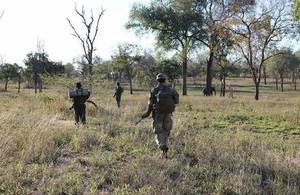UK Government helps train Park Rangers in Malawi to combat the illegal wildlife trade
With less than two months to go until the London Illegal Wildlife Trade conference, UK troops in Malawi, as the face of Global Britain, are helping to train conservation non-profit African Parks’ rangers.

Local park rangers and UK soldiers patrol Nkhotakota and Majete Wildlife Reserves in Malawi to combat poaching. Crown copyright.
After a successful pilot operation and with training now across two sites, Nkhotakota and Majete Wildlife Reserves, both are managed by African Parks in partnership with Malawi’s Department of National Parks and Wildlife (DNPW). The troops long-term goal will ensure the rangers are better skilled and able to respond appropriately to the threat of poaching.
Poaching and the illegal wildlife trade are responsible for the loss of countless species and are driving the decline of many African animals including elephants, rhinos and lions.
Defence Secretary Gavin Williamson said:
We can be incredibly proud of the important work our Armed Forces are doing to help protect the magnificent animals of Malawi and to bring about the end of the cruel practice of illegal wildlife trading. By passing on their world-class, tried and tested skills, we can be sure that UK troops are aiding a highly skilled and professional network of park rangers, one that can effectively combat the threat poachers pose to the African wildlife.
While British soldiers are working with rangers to support the protection of wildlife, the Department for International Development is working with poorer communities who live close to wildlife reserves to create job opportunities and improve vital services.
Foreign Office Minister for Africa Harriett Baldwin visited communities living on the edge of Majete Wildlife Reserve where she announced an additional £1 million of UK aid support to improve the lives of people living next to national parks.
Minster for Africa Harriett Baldwin said:
The UK is acting now to stamp out the illegal wildlife trade, which not only threatens the existence of some of our most precious species, but also inflicts damage on local communities and fuels corruption and crime which hold back development for some of the world’s poorest countries.
By bringing together our diplomatic, military and development support we’re helping countries like Malawi combat this crime, and also helping local people to benefit from living alongside these beautiful species, which is boosting economic growth and stability.
The increase in the UK Armed Forces’ support to Malawi has been funded by the Department for Environment, Food and Rural Affairs’ (DEFRA) as part of a three-year plan agreed by the Ministry of Defence and DEFRA.
Environment Secretary Michael Gove said:
Wildlife crime does not respect borders so we must share skills and expertise worldwide. The Malawi enforcement project demonstrates the global leadership we set out in the 25 Year Environment Plan. We are introducing one of the world’s toughest bans on ivory sales and will host the next international Illegal Wildlife Trade conference in London later this year.
The Government of Malawi has taken an effective and proactive approach to combating the illegal wildlife trade in their country, enhancing penalties for wildlife crime and partnering with African Parks and the UK Government to drastically reduce poaching activity and secure its parks for the benefit of future generations.
The CEO of African Parks, Peter Fearnhead said:
The Malawian Government has shown great leadership and commitment in conserving its parks, where together we’ve recruited, trained and outfitted rangers to establish robust law enforcement teams utilising technology and community engagement to secure the landscapes.
Effective park management, including law enforcement and community development, is essential in protecting the last of the wild and combatting the illegal wildlife trade at its source. The partnership with the UK Government importantly advances our ability to ensure that these increasingly threatened areas continue to function as critical sanctuaries benefitting millions of people and animals across Africa.